
The long history of the Thomist revival and its various idiosyncrasies is difficult going. Part of my research focuses upon the fruits of the tradition of scholastic “cosmology,” which nowadays we call the philosophy of nature. A new page collects and makes available some resources as part of that ongoing project.
Currently available is a draft translation of the prefaces and introduction, with some notes and other items, of Petrus Hoenen’s Cosmologia (5th ed.). Of particular interest are these words from Hoenen’s exordium:
Does one not at times pity the philosopher upon whom is inflicted the duty of teaching scholastic cosmology? For—as is suitable and particularly befitting for a peripatetic—if he wishes to diligently consult the sciences (which have accomplished much through their experiments), and if (so that he might follow them) he interrogates the physicists so as to have a great number of their answers, these contradict the scholastics, originating as they do from mechanistic philosophy. However, if he neglects them, apart from the fact that he in doing so denies also Aristotle and the great scholastics, that splendid atomic theory will always be reckoned against him, whose discussion he wishes to avoid and which, in its essential parts confirmed to a remarkable degree, will remain a possession forever.
Hoenen sought to avoid what he called a “concordism” between the Thomistic tradition and the modern natural sciences. That is, “concordism,” as I understand it, is his allusion to a method of scriptural exegesis, especially when interpreting the six days of creation in Genesis, which method attempts to broker an interpretive peace between the discoveries of the sciences and the literal text of the Bible by proposing various metaphorical or extended readings of certain passages or terms. This relates to attempts to understand the perennial philosophy of nature in relation to the modern sciences when one attempts a “facile concordism” between the two (in Maritain’s words). This analogy, as near as I can tell, was first used by Paolo Gény, “Metafisica ed esperienza nella Cosmologia,” Gregorianum 1.1 (1920): 95.